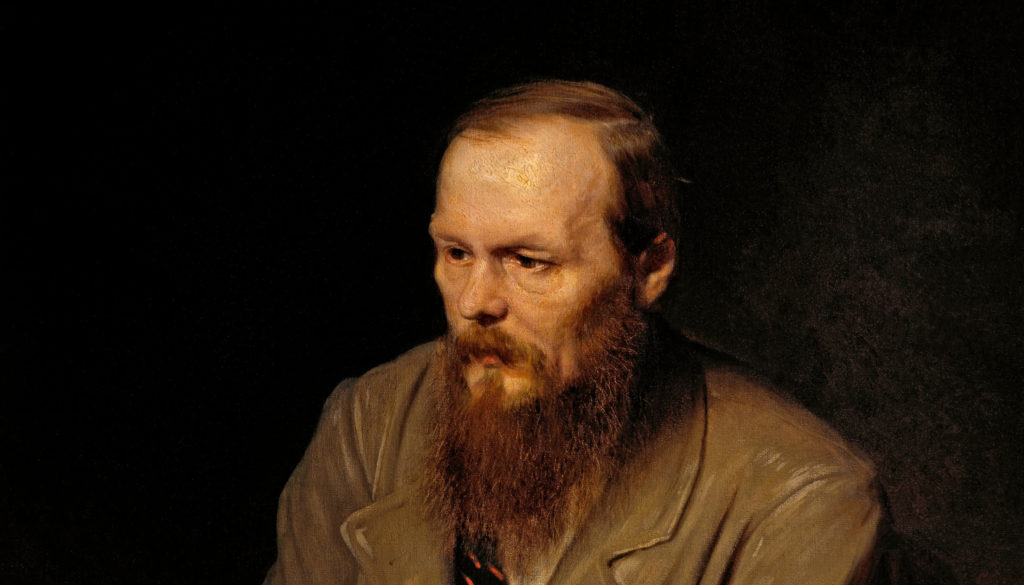In the novel The idiot (part III, ch. 5) that Dostoevsky writes between 1867 and 1869 - wandering through Europe with his second wife to flee from his creditors - asks from the lips of the atheist Ippolit if it is beauty that will save the world. We read: "'Is it true, prince, that you said on a certain occasion that the world will be saved by 'beauty' Gentlemen,' he said, addressing everyone, 'the prince assures us that beauty will save the world! And I for my part assure you that if he comes up with such perverse ideas it is because he is in love. [...] What beauty will save the world?' The prince - who is an example of meekness - fixed his eyes on him and did not answer".
For his part, Zosima, the wise priest from The Brothers KaramazovIn his youth he traveled through Russia with another monk, begging for alms for his monastery, and recalls how in his eyes God manifested Himself in beauty: "That young man and I were the only ones who did not sleep, talking about the beauty of the world and its mystery. Every grass, every beetle, an ant, a golden bee, all played their part admirably, by instinct, and bore witness to the divine mystery, for they were continually fulfilling it." Zosima and the young man speak of God's imprint on his creatures. The scene concludes, "How good and wonderful are all the works of God!".
In the complex and passionate spirit of Fyodor Dostoevsky, faith and unbelief struggle and confront each other; each of these two poles will be echoed in the personality of his literary creations, especially in The Brothers Karamazovwhich is a synthesis of Dostoevsky's perplexity and inner conflict and is very probably the peak of his maturity and creative work. "The most important question that I will examine in all the chapters of this book is precisely that which, consciously or unconsciously, has made me suffer all my life: the existence of God" (A. Gide, Dostoevsky through his Correspondence, 1908, p. 122).
This amazing writer, the great novelist of Tsarist Russia, who went through political conflicts, violent revolutions, inhospitable prisons, with an existence surrounded by material limitations, can nevertheless understand the peace that dwells in the pages of a text.
García Lorca remembered it this way in 1931: "When the famous Russian writer Fyodor Dostoevsky [...] was a prisoner in Siberia, far from the world, between four walls and surrounded by desolate plains of endless snow, and he asked for help in a letter to his distant family, he only said: 'Send me books, books, many books so that my soul does not die! He was cold and did not ask for fire, he was terribly thirsty and did not ask for water: he asked for books, that is, horizons, that is, ladders to climb to the summit of the spirit and of the heart".
In his life of passionate struggle and prolonged search in time, he tries to express one of the most painful questions of his existence: if God exists, how to prove it. "Dostoevsky will try in vain" - writes André Gide - "to reveal to the world a Russian Christ, unknown to the world", the Christ that accompanies him since his childhood and the Christ that he has portrayed in his soul.
Dostoevsky's works are full of life. As Gide also points out, Dostoevsky is "hard and tenacious in his work, he works hard at corrections, dismantles his writings and tenaciously reconstructs them, page after page, until he infuses them all with the intensity of his soul". Dostoevsky has portrayed marginal and abject lives, he has entered the most complex labyrinths of the human condition and from there he has given us back a look of compassion.
The creator of marginal characters never condemns his characters, never judges them, but understands them in all their magnitude and misery, trying to give meaning to suffering in order to give meaning to life itself. "Dostoevsky wrote: I fear only one thing, not to be worthy of my suffering," Viktor Frankl recalled in Man in search of meaning (p. 96).
The silence of God, the restlessness to find Him, that point at which the spirit unravels in a permanent internal quarrel, like that cry of Kinlov's in The Brothers KaramazovThe words "All my life I have been tormented by God", which is nothing but the cry of Dostoevsky himself, to whom it escapes from the depths of his being. But just as God's silence does not oppose his Word, neither does absence oppose his Presence. As Dimitri Karamazov exclaims: "It is terrible that beauty is not only something dreadful, but also a mystery. Here the devil fights against God, and the battlefield is the heart of man".
In the present time of light and shadow, the reading of Dostoevsky leads to a better understanding of the anxieties that so often hover over the hearts of many human beings and perhaps to the conclusion that it is Beauty that will save the world. In the words of Cardinal Ratzinger in Rimini (2002): "Dostoevsky's famous question, 'Will Beauty save us?' is well known. But in most cases it is forgotten that Dostoevsky is referring here to the redeeming beauty of Christ. We must learn to see it. If we do not know him merely by word of mouth, but are pierced by the dart of his paradoxical beauty, then we begin to know him truly, and not only by hearsay. Then we will have encountered the beauty of Truth, of redeeming Truth. Nothing can bring us closer to the Beauty, which is Christ himself, than the world of beauty that faith has created and the light that shines on the faces of the saints, through which his own light becomes visible."









